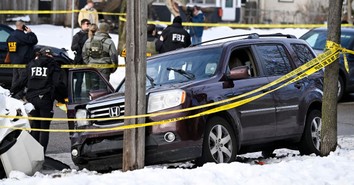On the Road to Glory: Disney Retells a Texas Legend

The year was 1966 and, as Charles Dickens would say, it was both the best and the worst of times.
Families attended church, neighbors knew one another, and mothers could afford to stay home with their children. The Oscar for Best Picture was awarded to “The Sound of Music” and Frank Sinatra took home the GRAMMY for Album of the Year.
But overseas, the Vietnam War was about to take a dangerous turn, and tens of thousands of young men would soon lose their lives. On the home front, another war was raging – a war for equality.
African Americans, who had won the right to vote under the Civil Rights Act just one year before, were still being treated as second class citizens. Segregation was still a reality, and the right to vote rarely included access to the polling places. Being black was still very dangerous – especially in the South.
On the basketball court, things were no different. College teams rarely recruited black players. Not one school in the Southeastern Conference or the former Southwest Conference had ever offered an athletic scholarship to a black player. And, on the rare occasion when one was invited to be a part of a team, he stayed on the bench.
Fortunately, one college coach was as determined as he was colorblind.
Don Haskins, a girl’s high school basketball coach from Oklahoma, was hired by Texas Western University (now the University of Texas at El Paso) to coach their fledgling basketball team. After being unable to recruit, due to lack of funding, Haskins solicited as much scholarship money as possible and headed for the streets, where he signed up the most promising black players he could find. He then went about training them to play college ball.
Later, when the team started winning, Haskins would be accused of intentionally seeking out black players. But the Texas Western coach wasn’t looking for color, which resulted in an outpouring of hate mail and abuse, toward him, his family and his players. Haskins was looking for talent – raw talent that could be shaped into a winning basketball team. And he wasn’t about to back down because people were racist.
“Haskins never understood why white players couldn’t play against black players and vice versa,” said Josh Lucas, who stars as the famed coach in Disney’s new film, “Glory Road.” “It made no sense to him. He just wanted to find the best players that he could recruit – no matter who they were or where they were from, as long as they had that potential. It was as simple as that to him.”
“This was Texas,” said Jerry Bruckheimer, who produced the film. “And Texas was not known for the civil rights movement. The [University of] Texas football team did not have a black player until 1969. So think about that. That’s three years after this team was integrated.”
The story of the Texas Western Miners has since become basketball legend. That year, with an astonishing 27-1 record, the Miners arrived in College Park, Maryland, where they faced off against the top-ranked University of Kentucky Wildcats in the NCAA Championship. The most astonishing fact was not the Miners' “Cinderella” 72-65 win over the Wildcats, as amazing as that was. What made history in 1966 was the fact that only black players appeared on the court – and they did so against the all-white Wildcats.
“What’s so interesting about Don Haskins is that he wasn’t looking to make any kind of statement. He simply was driven to win,” said Bruckheimer. “Yet in making winning priority, he changed history.”
Mehcad Brooks (ABC’s “Desperate Housewives”), who plays Harry Flournoy, starting forward of the Miners, grew up hearing about the team every night before bed.
“My dad is from west Texas, so it was a bedtime story for me,” he said. “Some people grew up knowing about Rapunzel and Hansel and Gretel. I grew up with bedtime stories of the Miners and their exploits. I knew about the coach, I knew the final score, I knew about the players.”
When Brooks learned that he had got a part in the film, he immediately called home.
“My father is a very distinguished, soft-spoken attorney, but he flipped out,” Brooks said. “He was like (holding a pretend phone to his ear), ‘You’re playing Flournoy? Oh, he was a great rebounder!’”
Also starring in the film are Derek Luke (“Antwone Fisher,” “Friday Night Lights”), who plays Bobby Joe Hill, the Miners' guard and high scorer, and Academy Award winner and four-time Oscar nominee Jon Voight.
Voight plays the stalwart Adolph Rupp, one of the winningest college coaches of all time and the famed name behind the Kentucky Wildcats for 42 years. Rupp so defined the Wildcats, in fact, that basketball games at the University of Kentucky now take place in Rupp Arena.
“I felt a responsibility to represent Adolph Rupp as he was in that moment,” said Voight, who chose to stay in character throughout the filming, which meant snubbing Lucas and even bossing around those who had been cast as his players. “He was one of the greatest coaches of our lifetime, and many admired his skills despite what was thought about his social views. He was also part of this great story in which Don Haskins shows that sometimes we do big things in life and don’t realize the importance at the time. And that is greatness.”
Many question whether Rupp, who did not recruit a black player until 1969, was a racist. During a press conference prior to the game, the coach stated that he did not believe that an all-black team could beat an all-white team.
Bruckheimer, however, says that there is no evidence this is the case.
“Adolph Rupp was a man of his times – that’s all he was,” he said. “There were no African-American athletes playing in the South. And we couldn’t find anything that he said on the record that was racist – ever. Even though I’ve read books that claimed he was a racist and said these things, we couldn’t find them.”
Although Haskins was never able to repeat his 1966 victory, he went on to coach many NBA players, including Tiny Archibald and Antonio Davis. He also coached the 1972 Olympic team and was elected to the Basketball Hall of Fame in 1997. But Haskin’s greatest triumph, without a doubt, is his courage. When the Miners won, people began to change the way they viewed African-American athletes – which paved the way for the desegregation of intercollegiate sports.
In the end, the film’s director, James Gartner says it best: “Just as Jackie Robinson broke the color barrier in baseball, in many ways Don Haskins and his team did the same for basketball.”
Starring Josh Lucas, Derek Luke, Austin Nichols and Emily Deschanel, "Glory Road" (Buena Vista Pictures) is rated PG and opens in theaters nationwide on Friday, January 13, 2006.
For more information, click here.
Originally published January 12, 2006.







